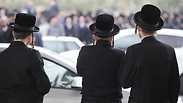
Haredi protest against draft bill
צילום: גיל יוחנן
Let IDF choose its recruits
Analysis: IDF has surplus of soldiers, shortage of quality manpower, new draft bill will only make matters worse
The new conscription bill, as appears in the draft formulated by the Shaked Committee, is a crushing defeat for the IDF.
While the Knesset may order the recruitment of thousands of haredim every year, the matter is primarily a burden for the army.
The army is not trying to increase its ranks at all costs. In fact, it is looking for ways to discharge its overloads, such as soldiers in non-combat positions in the home front, and to cut their service from three to two years. In this current budget reality, after the cut in defense expenses, the IDF does not need thousands of extra soldiers, most of whom are over 24 years of age and married with children, who could cost NIS 5,000 ($1,400) a month to maintain – a salary that is equal to the one of a lieutenant.
In general, how should these soldiers integrate within combat units alongside 18-year-olds? What about the commanders who would have to consider the needs of the soldiers who haven't gone home to see their children? The bill proposed by the Shaked Committee, in the eyes of the army, is not serious and will not stand the test of reality.
There are two areas in the military where the extra soldiers are much needed: The combat field and the technological one. The battlefield has changed, and today the contribution of each of the bright soldiers in the cyber and IT units can surpass the one of an entire fighter division.
The figures illustrate the demand for these soldiers: While four years ago the army recruited 100 soldiers a year for the cyber units, today some 500 soldiers a year are recruited for the same positions, and in the near future the numbers are estimated to reach 1,000 soldiers. These are soldiers with the highest personal attributes, and many of them reach the tech units despite their combat profile that was supposed to allocate them to combat positions, which too suffer a shortage of manpower.
The officers explain that they need soldiers of high standards also in units that in the past were not considered "technological", and so, for example, commanding a tank may require the ability to operate 40 advanced technological systems. This creates a situation in which the IDF may have a surplus of soldiers, but a shortage of quality manpower.
The new recruitment bill was supposed to tackle this problem, but the Shaked Committee rejected the IDF demand to establish a virtual induction center in which the army may determine for every 18-year-old whether it is interested in his or her recruitment. Instead, the committee chose to enable young haredim to postpone their service until the age of 24, and thus even those who would eventually strap on a uniform would do so at an age when their contribution to the IDF would be very limited, and the army would not be able to intervene and choose the soldiers it actually needs out of the potentially-conscripted bunch.
If the military was given the ability to choose, it is likely it would have chosen to recruit a smaller number of haredim from the numbers that appear in the Shaked Committee's conscription target. Those who eventually would bb recruited would have been sent to units with a genuine need for soldiers, and the genuine contribution to the IDF and the Israeli society would be greater.










